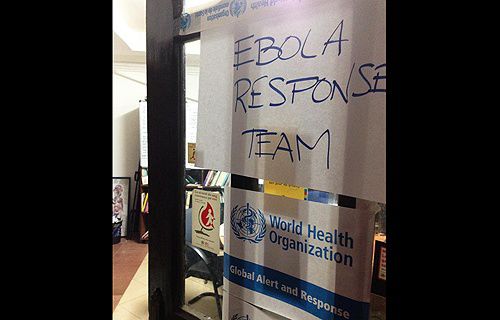Though the Church and others are doing much to help Ebola victims, “extraordinary measures” are needed to halt the epidemic, a Vatican advisor on health issues has said. “For example, in a health care center with a capacity of 70 patients, there is need for at least 250 health workers, and now there is a lack of them,” Monsignor Robert Vitillo told CNA. “The countries and the NGOs in the region are now searching for international volunteers to strengthen the professional response to the outbreak in those countries.” Msgr. Vitillo is special advisor to the Rome-based Catholic relief organization confederation Caritas Internationalis on HIV/AIDS. He also heads Caritas' delegation to the United Nations in Geneva and collaborates with the Holy See. He stressed that religious congregations are “very active” in Africa, with many religious brothers and sisters hailing from different countries. However, at present there is no structured network of volunteers. “We simply try to get in touch with doctors who already now with Caritas. And there are doctors who have expressed to Caritas their wish to go to help respond to the outbreak, and we put these doctors in touch with directors of the hospital. “We still have to think about the possibility of organizing this kind of initiative,” Msgr. Vitillo explained. Amid the Ebola outbreak, the Church will exercise its moral suasion to encourage pharmaceutical companies to reduce medicine prices and make health care more accessible, the monsignor stressed. “The Catholic Church certainly has a moral strength, and it has always promoted the solidarity and equitable justice which encourages pharmaceutical companies to reduce the price of medicines and to ensure that there is no research in the Global South if these medicines are not shared when developed,” he explained. Msgr. Vitillo took part in an Aug. 12 meeting called by the U.N. Office for the Coordination of Humanitarian Affairs in Geneva. The meeting included representatives of Guinea, Liberia, Nigeria and Sierra Leone as well as representatives of the World Health Organization and Doctors Without Borders to discuss the Ebola outbreak. During the meeting, Dr. Micaela Serafini, a physician of Doctor Without Borders Switzerland, stressed that the Ebola epidemic “has gone out of proportion.” “Today, we can say that it is completely outside of the capacity of the humanitarian aid; the international community must make a global effort,” he said. The death toll in the Ebola outbreak is still increasing. According to the World Health Organization, 142 new confirmed or suspected cases of infection were reported between Aug. 19 and Aug. 20. Of these, 77 died. Globally, 1,427 people have died since the surge of the epidemic due to confirmed or suspected Ebola infection. The news that two people arrived from Nigeria have been hospitalized in Voecklabruck, Austria, for suspected Ebola infection has raised the fear that the epidemic could spread in Europe, as well. Msgr. Vitillo said that the epidemic “has become very grave,” above all because “many of the health facilities of the involved countries are already poor, and it is difficult to immediately respond to this kind of emergency.” “The four countries involved in the infection need international solidarity. As Dr. Margaret Chan, director-general of the World Health Organization, stressed in the Aug. 12 humanitarian affairs meeting, the outbreak is unprecedented for its size, severity and complexity,” he continued. “We need extraordinary measures to address this.” The Aug. 12 meeting emphasized that the border areas including Guinea, Liberia and Sierra Leone are crucial. This “hot zone” has been isolated. Nearly one million people are affected in the border areas and they need daily support, including food. “There is always the danger that the infection should be spread in other countries, and this is the reason why we have talked about the needed preparation of the border countries to prevent the possibility,” Msgr. Vitillo maintained. However, Msgr. Vitillo is optimistic, since “at the moment, the cases of infection are limited to these four countries, and in Nigeria it is just limited to the federal state of Lagos, which is very positive.” There is a need of medicines, and especially of possible vaccines for the disease, but “at the moment there is not such a big supply of experimental medicines.” “There was a pharmaceutical company that had decided to send remaining doses to Liberia, and this is a step forward. But they don’t have other doses,” said Mgr. Vitillo. In the Aug. 12 humanitarian affairs meeting, World Health Organization officials pointed out that there is no approved treatment for Ebola. There are some experimental vaccines and there is an experimental treatment based on “mono-chromosomal antibodies.” The World Health Organization decided that the experimental therapy can be used, as long as the patient is fully informed about the risks and gives full consent. The procedure chosen is “very ethical and precise,” according to Msgr. Vitillo.

